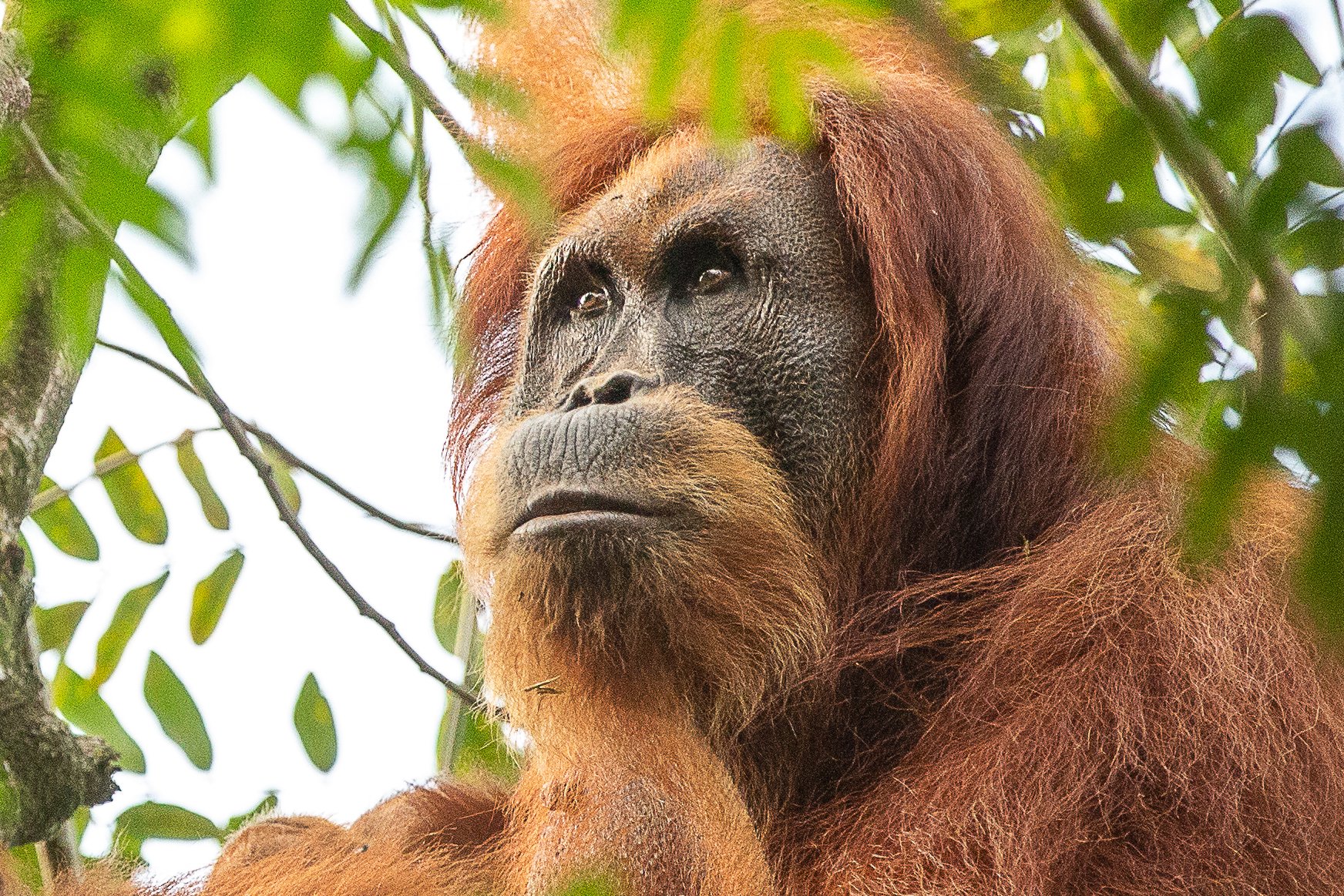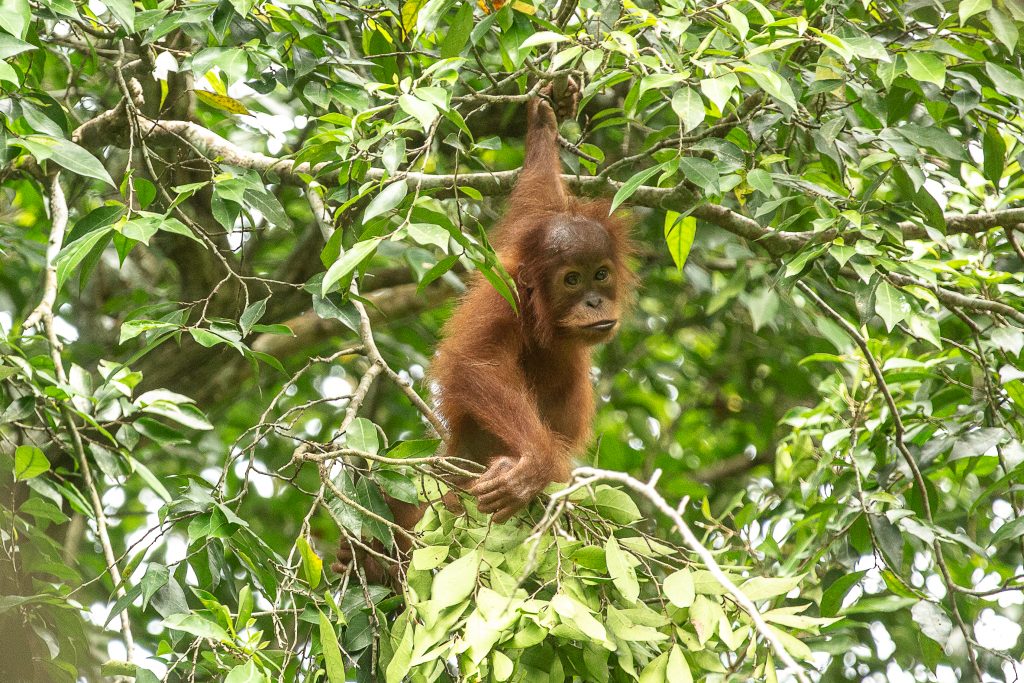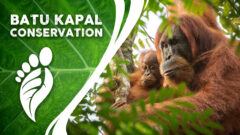
As we celebrate the International Orangutan Day, we'd like to help encourage the public to take action to protect this amazing species in the wild before it's too late.
Please show your support for orangutans today by posting a photo on your Facebook or Instagram page and tag @BatuKapalConservation! Add a message, mention that International Orangutan Day or #OrangutanDay is August 19th and gather friends to support the cause! Please also donate to our campaign to save the orangutans and the rainforest they live in.
Orangutans and COVID-19
You may have already heard the devastating news that COVID-19 has reached our nearest town Bukit Lawang and surrounding areas, with the village recording its first COVID cases and deaths in the past month. In such remote areas, there is not much testing happening and it’s hard to know how widespread the disease is. COVID doesn’t just affect humans, it also affects animals and so there is a significant risk that it would affect our closest living relatives, orangutans.
In January 2021, several gorillas at a California zoo tested positive for COVID-19 and they were the first non-human primates who have contracted the disease. Since the incident, the zoo staff received experimental COVID vaccines from the veterinary company Zoetis and administered them to some of the other great apes in the zoo, including orangutans–those were the first orangutans to receive a COVID vaccine.
Scientific evidence shows that orangutans, who share 97% of human DNA, are highly susceptible to diseases transmitted by humans, including the SARS-CoV-2 virus. If the virus were to infect even one wild orangutan, experts fear it could spread unchecked and wipe out an entire population. There would be no way to stop it in the wild (Read these articles in the National Geographic and the New York Times that talk about the current research and risks).
We do not know yet exactly if and how COVID impacts orangutans but we must take all the necessary precautions to avoid the worst case scenario.
In this video, Charlie with young Marlie clinging onto her back, swing past the Batu Kapal base back in June 2019. How amazing are the sounds of the jungle…. Enjoy!
Promoting ethical tourist practices
Wild orangutans shy away from humans and do not come out of the trees. The closest distance that tourists get to wild orangutans is about 7 metres. However, what makes us especially worried is that there a lot of rescued orangutans who were released into the national park around Bukit Lawang and tourists would often approach those tame orangutans, touch and feed them.
The Gunung Leuser National Park has been closed since the pandemic erupted and many wildlife sanctuaries had to pause on releasing rescued orangutans indefinitely, however, we fear about the risk once tourism resumes.
We must prevent further close encounters between visitors and orangutans to avoid the risk of passing the disease, as well as for various other reasons. There is a threat that vaccinated people could transfer the virus to the animals when visiting wildlife parks in the future. If any of the orangutans were to catch a virus from humans that could wipe out the entire population.
It is thus critically important for us to promote ethical practices of keeping a safe distance and taking the right precautions to minimize the risk of transferring the disease to orangutans.
Orangutan face the threat of extinction from habitat loss and degradation, illegal hunting, illegal pet trade and potentially, disease.
To protect ourselves against future pandemics, scientists believe protecting nature is the most effective way.
Some of the deadliest new diseases, including Ebola, SARS, HIV as well as COVID-19, have all occurred due to humans encroaching upon wildlife habitat.
By protecting Orangutans and their habitat, it would mean we are making the necessary changes to protect all life on Earth. By saving orangutans and their habitat, we are ultimately saving our environment and ourselves.
Protecting orangutans from conflicts with farmers
The orangutans’ dwindling habitats have made them vulnerable to frequent contacts with human populations at the edges of the forest. In the areas where we work, wild orangutans stay in the tall ficus trees just above the farmlands, and they often come into conflict with local farmers, especially during the durian season, as they are attracted to the fruit trees in the farmers’ gardens. It’s vital that our ranger team works with the farmers to prevent those conflicts.
Our ranger and Batu Kapal conservation team work tirelessly to protect this species, starting the day with monitoring the population of orangutan in the area, visiting local farmers to give them fireworks to help diffuse orangutan conflict situations in non-harmful ways and planting trees in the wildlife corridor to restore the habitat where orangutans live. Learn more about the work of our wildlife protection team here.
Please join us today, to support our wonderful conservation program to ensure that the orangutans living in this biodiversity hotspot in the Gunung Leuser bufferzone are protected for many generations to come.
Why should you support this Orangutan Day?
We believe in saving the orangutan for its intrinsic value. However, it may be worth reminding ourselves about a few other reasons how we all benefit from protecting this awe-inspiring species.
- Protecting Orangutans and their habitat also protects the other species that live here, including the endangered Sumatran Tiger, Sumatran Elephant and Sumatran Rhino. Did you know the Gunung Leuser National Park that is on our door step, is the only place in the world where these animals exist together?!
- Orangutans bring in tourism and an income to the area. Without orangutans, thousands of local people lose their livelihoods.
- Orangutans are seed dispersers which means they help shape one of the oldest rainforests in the world and help give home to thousands of endemic species of both flora and fauna.
- Orangutan habitat absorbs carbon. If destroyed, around 16 times the amount of carbon that’s in our atmosphere today will be released.
- As we all know, rainforests are the lungs of the earth. Orangutan habitat provides the planet with clean air and water for the local communities, as well as flood protection.
- Supporting orangutan conservation means helping to find a solution to unsustainable palm oil that’s destroying the forest and making it uninhabitable for both people and wildlife.

As we can’t travel to see the orangutans in real life, take a look at some beautiful images of orangutans in The World Through a Lens series, where a photojournalist gives us a virtual tour of Sumatra and the Gunung Leuser National Park.
